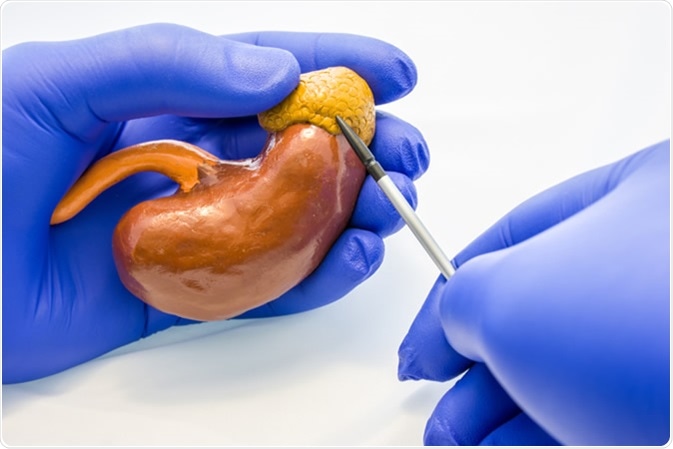Following a diagnosis of adrenal cancer, there are several treatment options that may be used. Each of these techniques has unique advantages and disadvantages that will make it preferable for some cases and not others. As adrenal cancer is relatively rare, it can be worthwhile to collaborate with other endocrine specialists to discuss the best treatment options for the particular case.
The treatment of adrenal cancer typically involves a multidisciplinary team a may include surgeons, endocrinologists, radiation oncologists, medical oncologists, nurses, psychologists, social workers, and other health professionals.

Doctor or scientist holds in hand model of adrenal gland with kidney organ and points with pointer on gland body in other hand. Image Credit: Shidlovski / Shutterstock
Surgery
The most common treatment for adrenal cancer is adrenalectomy or surgical removal of the adrenal gland. In this procedure, the cancer is removed as much as possible, including areas where the cancer has spread to such as nearby lymph nodes.
The procedure can be performed in two main ways: through an incision in the back below the ribs or an incision in the front of the abdomen. The incision in the back is useful to remove small tumors but can be difficult for larger tumors. As such, the incision in the front of the abdomen is the most common method used in practice.
If the cancer has metastasized to other areas of the body, such as the liver, surgical removal of these secondary tumors may also be needed.
For small adrenal tumors, a laparoscope can also be inserted into the adrenal gland to view the tumor and remove it. This is most commonly used for smaller tumors and helps to reduce recovery time. However, it cannot be used for larger tumors as the whole tumor should be removed in one piece to reduce the risk of recurrence.
Adrenal Tumor Removal
Radiation therapy
Radiotherapy, which involves a focused beam of high-energy radiation, can be used to target the region of the cancerous cells in the adrenal gland. This is usually used as adjuvant therapy, in addition to other techniques such as surgery.
There are two main types of radiation therapy that may be used: external beam radiation therapy and internal radiation therapy (brachytherapy).
External beam radiation therapy uses a machine outside of the body to direct the radiation towards the adrenal gland. The radiation is usually administered once or twice a day, five days a week for a treatment period of approximately 6 weeks. In this type of radiation therapy, the surrounding tissue that the radiation passes through before it reaches the tumor is also affected. Treatment times are kept short to minimize this, but some adverse effects may be experienced.
Internal radiation therapy, also known as brachytherapy, uses small pellets of radioactive material, which are placed inside the body next to or inside the tumor. This is usually left inside the body for a few days then removed. The localization of the radiation helps to reduce exposure to the surrounding tissues.
Chemotherapy
Chemotherapy for patients with adrenal cancer may be administered via intravenous injection or oral medications. This technique is usually reserved for patients with stage 4 adrenal cancers because it can help to destroy cancer cells in several parts of the body simultaneously. For cancer contained in the adrenal gland, surgical removal is usually preferred.
Mitotane is a common chemotherapeutic agent used for adrenal gland because it can block adrenal gland hormone production and destroys cancers cells. It is particularly useful for cancers caused by excessive hormone production. Like other chemotherapeutic agents, it also destroys some healthy cells in this process.
Other chemotherapeutic agents, which are often used in combination with mitotane, may include:
- Cisplatin
- Doxorubicin
- Etoposide
- Streptozocin
- Paclitaxel
- 5-fluorouracil
- Vincristine
Other medications
There are several other medications that may be used in the treatment of adrenal cancer, primarily to reduce the production of hormones related to the tumor. These may include:
- Ketoconazole and Metyrapone to reduce the production of adrenal steroid hormones
- Spironolactone to decrease the effects of aldosterone
- Mifepristone to decrease the effects of cortisol
- Tamoxifen, Toremifene, and Fulvestrant to block the effects of estrogen
Upcoming therapies for treating adrenal cancer
References
Further Reading
Last Updated: Jan 2, 2023